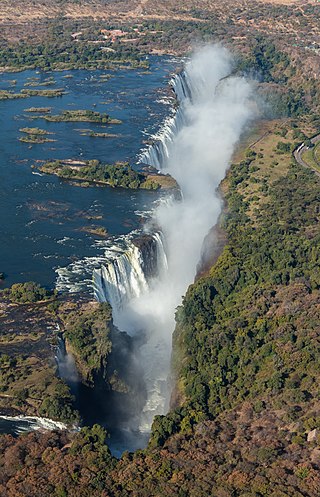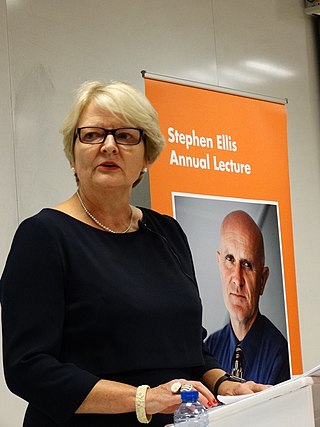Related Research Articles

Kenneth Kaunda, also known as KK, was a Zambian politician who served as the first president of Zambia from 1964 to 1991. He was at the forefront of the struggle for independence from British rule. Dissatisfied with Harry Nkumbula's leadership of the Northern Rhodesian African National Congress, he broke away and founded the Zambian African National Congress, later becoming the head of the socialist United National Independence Party (UNIP).

Zambia, officially the Republic of Zambia, is a landlocked country at the crossroads of Central, Southern and East Africa. It is typically referred to being in South-Central Africa or Southern Africa. It is bordered to the north by the Democratic Republic of the Congo, Tanzania to the north-east, Malawi to the east, Mozambique to the southeast, Zimbabwe and Botswana to the south, Namibia to the southwest, and Angola to the west. The capital city of Zambia is Lusaka, located in the south-central part of Zambia. The population is concentrated mainly around Lusaka in the south and the Copperbelt Province to the north, the core economic hubs of the country.
The Kwacha is the currency of Zambia. It is subdivided into 100 Ngwee.

Victoria Falls is a waterfall on the Zambezi River, located on the border between Zambia and Zimbabwe. It is one of the world's largest waterfalls, with a width of 1,708 m (5,604 ft). The region around it is inhabited by several species of plants and animals.

Hutchinson Heinemann is a British publishing firm founded in 1887. It is currently an imprint which is ultimately owned by Bertelsmann, the German publishing conglomerate.
The Zambia national football team represents Zambia in association football and is governed by the Football Association of Zambia (FAZ). During the 1980s, they were known as the KK 11, after founding president Dr. Kenneth Kaunda ("KK") who ruled Zambia from 1964 to 1991. After the country adopted multiparty politics, the side was nicknamed Chipolopolo which means the "Copper Bullets". The team won an Africa Cup of Nations title in 2012. This team has also become the most successful team in the COSAFA Cup, surpassing Zimbabwe after winning the 2023 edition.
The African Writers Series (AWS) is a collection of books written by African novelists, poets and politicians. Published by Heinemann, 359 books appeared in the series between 1962 and 2003.

A total solar eclipse occurred at the Moon's ascending node of orbit on Thursday, June 21, 2001, with a magnitude of 1.0495. It was the first solar eclipse of the 21st century. A solar eclipse occurs when the Moon passes between Earth and the Sun, thereby totally or partly obscuring the image of the Sun for a viewer on Earth. A total solar eclipse occurs when the Moon's apparent diameter is larger than the Sun's, blocking all direct sunlight, turning day into darkness. Totality occurs in a narrow path across Earth's surface, with the partial solar eclipse visible over a surrounding region thousands of kilometres wide. Occurring about 2.25 days before perigee, the Moon's apparent diameter was larger.

Richard Gordon, was an English ship's surgeon and anaesthetist. As Richard Gordon, Ostlere wrote numerous novels, screenplays for film and television and accounts of popular history, mostly dealing with the practice of medicine. He was best known for a long series of comic novels on a medical theme beginning with Doctor in the House, and the subsequent film, television, radio and stage adaptations. His The Alarming History of Medicine was published in 1993, and he followed this with The Alarming History of Sex.

William Heinemann Ltd., with the imprint Heinemann, was a London-based publisher founded in 1890 by William Heinemann. Their first published book, 1890's The Bondman, was a huge success in the United Kingdom and launched the company. He was joined in 1893 by Sydney Pawling. Heinemann died in 1920 and Pawling sold the company to Doubleday, having worked with them in the past to publish their works in the United States. Pawling died in 1922 and new management took over. Doubleday sold his interest in 1933.

Frank Mkalawile Chipasula is a Malawian writer, editor and university professor, "easily one of the best of the known writers in the discourse of Malawian letters".

Russia–Zambia relations are the bilateral relations between Russia and Zambia.

Dame Henrietta Louise Moore, is a British social anthropologist. She is the director of the UCL Institute for Global Prosperity at University College, London, part of the Bartlett, UCL's Faculty of the Built Environment.

Lusaka is the capital and largest city of Zambia. It is one of the fastest-developing cities in southern Africa. Lusaka is in the southern part of the central plateau at an elevation of about 1,279 metres (4,196 ft). As of 2019, the city's population was about 3.3 million, while the urban population is estimated at 2.5 million in 2018. Lusaka is the centre of both commerce and government in Zambia and connects to the country's four main highways heading north, south, east, and west. English is the official language of the city administration, while Bemba and Nyanja are the commonly-spoken street languages.

The South African Railways Class 34-200 of 1971 is a diesel-electric locomotive.
Yulisa Amadu Pat Maddy was a Sierra Leonean writer, poet, actor, dancer, director and playwright. Known by his friends and colleagues as Pat Maddy or simply Prof, he had an "immense impact" on theatre in Sierra Leone, Nigeria and Zambia.
John O. Reed was an anthologist and translator of African literature.
Netball in Kenya is primarily played by girls. The Kenya Netball Association changed its name to its current one in 1966, and became the first African nation to join the International Federation of Netball Associations. Club netball is played in the country. The national team has qualified for the Commonwealth Games.
Zambia Shall Be Free is a 1962 political autobiography by Zambia's first president Kenneth Kaunda published as part of the Heinemann African Writers Series. The biography is a critique of colonial rule, and the power of democracy in liberating the varied people ruled in the new Zambia.
References
- ↑ Scott D. Taylor, Culture and customs of Zambia, 2006, pp.45-6